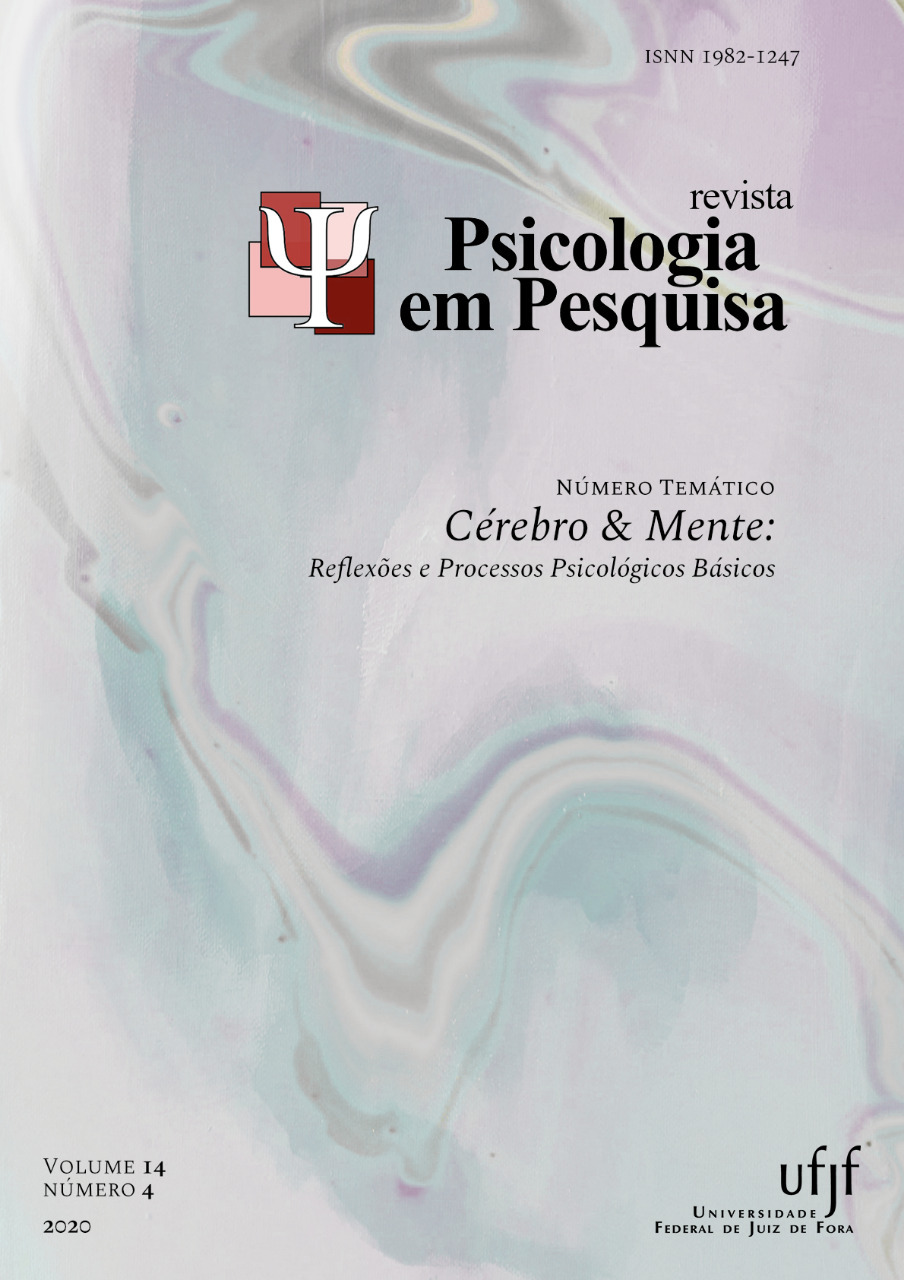Fluid intelligence as a predictor of academic performance in Portuguese and Mathematic
DOI:
https://doi.org/10.34019/1982-1247.2020.v14.30398Abstract
The present search studies the correlation between data of the BPR-5 Intelligence test with a school assessment of mathematics and portuguese language and from a sample of 679 ninth grade students from four elementary private schools. The results indicate a strong correlation and statistically significant with IQ test scores (r =, 58, p < 0.01), showing high loads on Fluid Intelligence (Gf). A longitudinal analysis (5th to 9th grade) was applied using the Latent Growth Curve Model, which investigated the average initial variance (intercept) and the average growth (slope) in the subjects' academic performance (AP), in two models (with and without the independent variable BPR), aiming to investigate the predictive capacity of Gf in AP. When the variable BPR was inserted, its impact on the intercept was estimated at 20,288 and on the slope, 6,381. These outcomes indicate the increase on initial performance and growth in AP due to each additional point in the BPR score. The difference between the intercept and the slope was negative and statistically significant (-224,156, p < 0.01), indicating that the subjects who presented lower initial AP had a higher growth in the evaluated period. Thus, the Gf's predictive ability on AP was demonstrated, which corroborates with the literature results.
Downloads
References
Almeida, L. S. (1988). O impacto das experiências educativas na diferenciação cognitiva dos alunos: Análise dos resultados em provas de raciocínio diferencial. Revista Portuguesa de Psicologia, 24, 131-157.
Cattell, R. B. (1971). Abilities, their structure, growth, andaction. Boston: Houghton Mifflin.
Ceci, S. J. (1991). How much does schooling influence general intelligence and its cognitive components? Developmental Psychology, 27, 703-722.
Colom, R., & Flores-Mendoza, C. E. (2007). Intelligence predicts scholastic achievement irrespective of SES factors: evidence from Brazil. Intelligence, 35(3), 243-251.
Coyle, T. R., & Pillow, D. R. (2008). SAT and ACT predict college GPA after removing g. Intelligence, 36(6), 719-729.
Deary, I. J., Strand, S., Smith, P., & Fernandes, C. (2007). Intelligence and educational achievement. Intelligence, 35(1), 13-21.
Floyd, R. G., Evans, J. J., & Mcgrew, K. S. (2003). Relations between measures of Cattell–Horn–Carroll (CHC) cognitive abilities and mathematics achievement across the school-age years. Psychology in the Schools, 40, 155−171.
Gomes, C. M. A., & Golino, H. F. (2012). O que a inteligência prediz: diferenças individuais ou diferenças no desenvolvimento acadêmico? Psicologia: teoria e prática. 14(1), 126-139.
Green, C. T., Bunge, S. A., Chiongbian, V. B., Barrow, M., & Ferrer, E. (2017). Fluid reasoning predicts future mathematical performance among children and adolescents. Journal of Experimental Child Psychology, 157, 125-143.
Gustafsson, J. E. (2001). Schooling and intelligence: Effects of track of study on level and profile of cognitive abilities. International Education Journal, 2, 166-186.
Hu, L., & Bentler, P. M. (1999). Cut-off criteria for fit indexes in covariance structure analysis: Conventional criteria versus new alternatives. Structural Equation Modeling, 6, 1-55.
Karbach, J., Gottschling, J., Spengler, M., Hegewald, K., & Spinath, F. M. (2013). Parental involvement and general cognitive ability as predictors of domain-specific academic achievement in early adolescence. Learning and Instruction, 23, 43-51.
Lemos, G., Almeida, L. S., Guisande, M. A., & Primi, R. (2008). Inteligência e rendimento escolar: análise da sua relação ao longo da escolaridade. Revista Portuguesa de Educação, 21(1), 83-99.
Nascimento, M. M., & Rueda, F. J. M. (2014). Estudo da estrutura interna do Teste de Inteligência – TI. Psico-USF, 19(2), 307-316.
Nisbett, R. E. (2013). Schooling makes you smarter: What teachers need to know about IQ. American Educator, 37(1), 10-19.
Primi, R., Couto, G., Almeida, L. S., Guisande, M. A., & Miguel, F. K. (2012). Intelligence, age and schooling: Data from the Batery of ReasoningTests (BRT-5). Psicologia: Reflexão e Crítica, 25(1), 79-88.
Primi, R., Ferrão, M. E., & Almeida, L. S. (2010). Fluid Intelligence as a predictor of learning: A longitudinal multilevel approach applied to math. Learning and Individual Differences, 20, 446-451.
Primi, R., Santos, A. A. A., Vendramini, C. M., Taxa, F., Muller, F. A., Lukjanenko, M. F., & Sampaio I. S. (2001). Competências e Habilidades Cognitivas: Diferentes definições do mesmo constructo. Psicologia: Teoria e Pesquisa. 17(2), 151-159.
Ritchie, S. J., Bates, T. C., & Deary, I. J. (2015). Is Education Associated With Improvements in General Cognitive Ability, or in Specific Skills. Developmental Psychology, 51(5), 573-582.
Silva, J. A. da, Ribeiro-Filho, N. P., & Santos, R. C. dos (2012). Inteligência humana e suas implicações. Temas em Psicologia. 20(1), 155-187.
Soares, D. L., Lemos, G. C., Primi, R., & Almeida, L. S. (2015). The relationship between intelligence and academic achievement throughout middle school: The role of students’ prior academic performance. Learning and Individual differences, 41, 73-78.
Spinath, B., Spinath, F. M., Harlaar, N., & Plomin, R. (2006). Predicting school achievement from general cognitive ability, sef-perceived ability, and intrinsic value. Intelligence, 34(4), 363-374.
Swanson, H. L., Jerman, O., & Zheng, X. (2008). Growth in working memory and mathematical problem solving in children at risk and not at risk for serious math difficulties. Journal of Educational Psychology, 100, 343−379.
Tamez, E., Myerson, J., & Hale, S. (2008). Learning, working memory, and intelligence revisited. Intelligence, 78, 240−245.
Taub, G. E., Floyd, R. G., Keith, T. Z., & McGrew, T. Z. (2008). Effects of general and broad cognitive abilities on mathematics achievement. School Psychology Quarterly, 23, 187−198.
Voelkle, M. C.,Wittmann, W. W., & Ackerman, P. L. (2006). Abilities and skill acquisition: A latent growth curve approach. Learning and Individual Differences, 16, 303−319.
Watkins, M. W., Lei, P. W., & Canivez, G. L. (2007). Psychometric intelligence and achievement: a cross-lagged panel analysis. Intelligence, 35(1), 59-68.
Weber, H. S., Lu, L., Shi, J., & Spinath, F. M. (2013). The roles of cognitive and motivational predictors in explaining school achievement in elementary school. Learning and Individual Differences, 25, 85–92.
Zhang, Z., Davis, H. P., Salthouse, T. A., & Tucker-Drob, E. M. (2007). Correlates of individual, and age-related, differences in short-term learning. Learning and Individual Differences, 17, 231−240.















